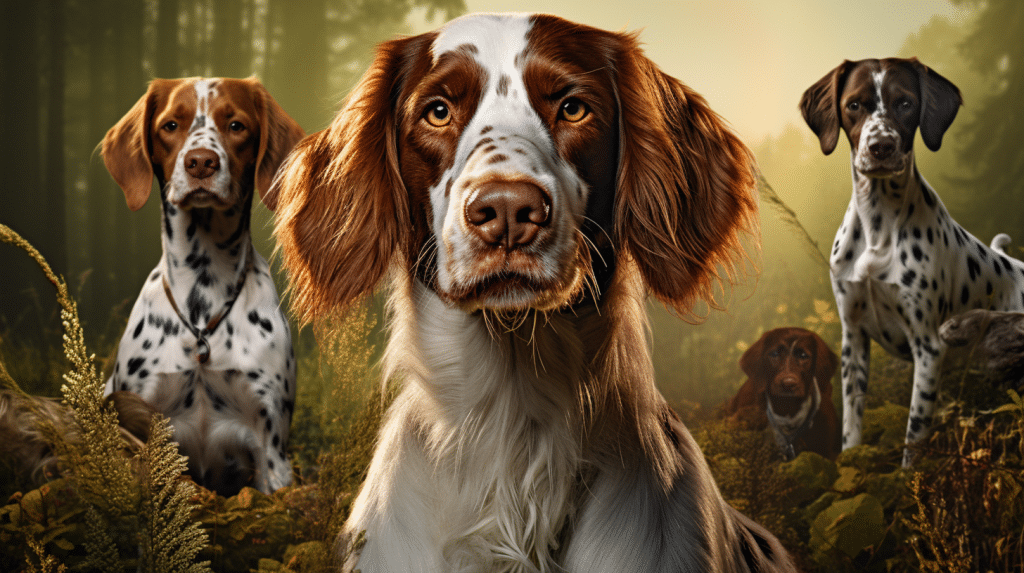What Breeds Make up the Brittany?: You’re likely charmed by the Brittany’s vivacious spirit and versatile abilities. But have you ever wondered about the cocktail of breeds that created this unique canine? Combining a rich history and fascinating genetics, the Brittany’s lineage can offer insights into their behavior and health. Understanding the breeds that make up your Brittany isn’t just intriguing; it’s a journey deep into the heart of your furry friend. Dive in, and let’s uncover the captivating ancestry of the Brittany breed.
The Origin and History of the Brittany Breed
Get ready to explore the intriguing history and origins of the Brittany breed. This breed’s story starts in Brittany, France. The name of the breed has changed over time, reflecting its varied genetic makeup. Originally known as Brittany Spaniels, they were later simply called Brittanys. This change was due to their distinctive traits that set them apart from regular Spaniels.
During the 17th and 18th centuries, breeders specifically chose these dogs for their hunting prowess. They wanted a dog that could both flush out game and retrieve it, a mix of skills that was uncommon at the time. As a result, the Brittany’s ancestors were likely a blend of different setters and spaniels, each contributing unique traits.
The Brittany’s name continued to evolve. As the breed reached America, local breeders began developing their version, appropriately called the American Brittany. These dogs are generally larger and quicker than their French counterparts, reflecting the American preference for dogs able to cover vast hunting grounds swiftly.
The exact breeds that make up the Brittany’s genetic pool are unknown. However, it’s clear that the breed originated from a need for a versatile, hard-working hunting dog. When you look into the eyes of a Brittany, you see the result of centuries of meticulous breeding intended to create an ideal hunting partner.
Understanding the Brittany’s complex history can enrich your appreciation of this smart, energetic breed. As a breed, Brittanys are known for their intelligence and stamina. They need regular exercise and mental stimulation. If you’re thinking of getting a Brittany, ensure you have the time and energy to meet their needs. Their history as hunting dogs means they can be a bit feisty and require consistent, positive training methods. With the right care and training, Brittanys make excellent companions for active families.
Key Characteristics That Define the Brittany
Let’s explore the main traits of the Brittany breed, a dog that is both unique and adaptable. This breed is recognized for its nimbleness and excellent hunting skills. Additionally, its lifespan is longer than many other breeds, with a Brittany typically living between 12 to 14 years. This long lifespan indicates how healthy and vigorous these dogs are.
Another notable trait of the Brittany breed is their coat. They have a densely packed, flat or slightly wavy coat that is not too long. You’ll also see feathering on their legs, ears, and chest. This coat type is specially adapted to shield them from underbrush and thorns when they’re out hunting. Brittany dogs don’t need much grooming. Usually, a thorough brushing once a week is enough to keep their coat looking its best. However, if they’ve spent the day out in the field, they may need a bit more grooming to remove any trapped debris or knots.
Brittany dogs are not just physically impressive; their mental abilities are also noteworthy. Training a Brittany is crucial to bring out their intelligent and eager-to-please personality. They are highly receptive to training, and with regular, positive reinforcement techniques, they can quickly learn commands and tricks. However, it’s important to remember that they are an energetic breed and need lots of exercise to stay healthy and content.
Drawing from my experience as a professional dog trainer, I can vouch for the Brittany’s highly trainable nature. Patience, consistency, and positive reinforcement are key in their training regimen. Regular mental and physical stimulation can help prevent behavioral issues and keep them happy. Also, establishing a regular grooming routine from a young age will keep their coat in top condition and acclimate them to the process.
The Brittany is a breed that personifies versatility, with a balance of physical stamina, intelligence, and a relatively simple grooming routine. These features, along with their long lifespan, make them an ideal choice for those seeking an active, trainable, and low-maintenance canine companion. The Brittany breed is truly unique, offering more than just its distinctive genetic mix.

Understanding the Brittany’s Genetic Makeup
The Brittany’s unique traits are a result of its diverse genetic makeup, shaped by careful breeding from several dog breeds. This charming and energetic dog we know today is a result of this meticulous process.
Unraveling the Brittany’s genetic makeup involves DNA sequencing – a complex yet fascinating scientific process. By decoding the exact sequence of genes in a Brittany’s DNA, we can understand the breed’s genetic diversity.
Genetic diversity is a cornerstone for the overall health and strength of a breed. It influences everything from the dog’s physical look to its risk of certain diseases. The Brittany, blessed with high genetic diversity, is usually a healthier and more robust breed.
Here’s where breeding ethics come into play. Responsible breeders put the health of their dogs first, before aesthetic traits. They work to:
- Keep the breed’s unique traits without overbreeding.
- Test for potential genetic problems to avoid passing them to the next generation.
- Promote the overall health and strength of the breed.
As a professional breeder with several years of experience, I can tell you that maintaining these standards isn’t always easy. But it’s vital for preserving the breed’s genetic diversity.
If you’re considering owning a Brittany, I’d advise you to choose a breeder who follows these ethics. Ask them about their breeding process, their testing for genetic issues, and how they work to maintain the breed’s health.
The Major Breeds That Contribute to the Brittany
The Brittany may seem like a purebred dog, but it’s actually a mix of two main breeds: the English Setter and the Spaniel. These breeds were probably selected due to their superb hunting capabilities. The Brittany, known for its agility and sharp sense of smell, has inherited these abilities.
Understanding the Brittany’s genetic composition is key when training this breed. The English Setter, known for its calmness and patience, influences the Brittany’s trainability. Brittanys are fast learners who also need mental challenges to avoid becoming bored. In my experience as a trainer, I’ve found that puzzle toys and agility training work wonders for keeping Brittanys engaged.
The Spaniel’s genetics significantly impact the Brittany’s nutritional needs. As active dogs, Spaniels need a protein and fat-rich diet to match their energy. Consequently, a Brittany requires high-quality food to fuel its energy levels, sustain its health, and prevent obesity. It’s advisable to consult with a vet to develop a specific meal plan for your Brittany.
The English Setter and Spaniel both contribute to the Brittany’s lifespan, which averages 12-14 years, quite long for a breed of its size. Regular veterinary check-ups, a balanced diet, and plenty of exercise can help ensure your Brittany lives a long, healthy life.
Knowing that the Brittany is a mixed breed helps cater to its unique requirements. Whether it’s training, diet, or health care, understanding its genetic background ensures you’re well prepared to give your Brittany the best possible care. In my years of working with Brittanys, I’ve found that patience, consistency, and understanding their needs lead to a happy, healthy dog.
Impact of Ancestry on the Brittany’s Behavior and Health
The Brittany’s behavior and health are significantly shaped by its ancestry. This breed is energetic, enthusiastic, and has a strong hunting instinct, which comes from its ancestors, mainly used as hunting and working dogs.
Knowing about the Brittany’s lineage helps understand its need for an active lifestyle. This breed requires plenty of exercise due to its high energy and working dog history. The Brittany’s forebears were outdoor dogs, and their love for physical activity has been inherited by the breed.
The Brittany’s health and longevity are also deeply rooted in its ancestry. Common health conditions like hip dysplasia and epilepsy are often hereditary. However, with responsible breeding and advancements in veterinary medicine, these health issues can be effectively managed. This allows the Brittany to enjoy a long, healthy life.
In my years of experience as a veterinarian, I’ve observed that Brittanys thrive best in active households. They love to run, fetch, and play, which also helps keep them healthy.
To keep your Brittany healthy and happy, I recommend daily vigorous exercise. This can be in the form of a long walk, a game of fetch, or even agility training. Regular check-ups with a vet can also help to identify and manage any potential health issues early.
In summary:
- The Brittany is an energetic, instinctual breed, making them great working dogs or pets for active families.
- This breed needs regular, intense exercise for its health and happiness.
- Brittanys are generally healthy, but they can be prone to certain inherited conditions. Responsible breeding and good veterinary care can manage these.
Understanding the Brittany’s ancestry gives important insights into their behavior, health, and care needs. As a Brittany owner, this knowledge can help you provide the best care for your pet.
Frequently Asked Questions
What Is the Average Lifespan of a Brittany Breed?
You’re asking about the lifespan of the Brittany breed. Due to their genetics, Brittanys typically live between 12-14 years. This can be influenced by various factors, including health conditions prevalent in the breed like hip dysplasia. It’s important to understand their aging process and provide them with proper care and regular vet check-ups. Remember, a healthy lifestyle can significantly impact a Brittany’s lifespan.
How Do I Properly Care for and Maintain the Health of a Brittany?
To care for your Brittany, you’ll need to focus on grooming, training, and understanding their temperament. Brittany grooming techniques include regular brushing to prevent matting. Training a Brittany requires consistency and positive reinforcement. They’re highly energetic and intelligent dogs, so daily mental and physical exercise is crucial. Dealing with a Brittany’s temperament means acknowledging their need for companionship. They thrive when involved in family activities. Remember, proper care maintains their health and happiness.
Are Brittanys Suitable for Families With Young Children?
Yes, Brittanys are an excellent choice for families with young children. Their temperament is gentle, making them patient and loving towards kids. You’ll find training Brittanys to be rewarding as they are intelligent and eager to please. Regarding adaptability, Brittanys blend well into family life and adapt to different environments easily. Just remember, they’re active dogs who need regular exercise to stay happy and healthy. They’re not just pets, but become part of the family.
What Kind of Diet Is Best for a Brittany Breed Dog?
You’re probably wondering if your Brittany’s diet should include a daily dose of baguettes and cheese, given their French origins. Jokes aside, Brittanys have specific dietary needs. They’re prone to allergies and obesity, so a diet rich in lean proteins, whole grains, and vegetables is ideal. Also, avoid fillers that can cause allergic reactions. Regular exercise and portion control are key for weight management. Remember, each dog is unique. Monitor your Brittany’s health and adjust their diet accordingly.
How Much Exercise Does a Brittany Breed Require Daily?
You’re wondering about the exercise needs of a Brittany. These energetic dogs require substantial daily exercise. Incorporating Brittany training tips, you’ll find that a mix of physical and mental stimulation works best. Think long walks, fetch games, and agility training. Be mindful of over exercising dangers, especially in puppies. Remember, every Brittany is unique, so adjust their exercise routines as necessary. A happy Brittany is an active one, so keep them moving, but always monitor for signs of fatigue.

 dog history of the brittany
dog history of the brittanyConclusion
So, you’ve journeyed through the Brittany’s history, characteristics, and genetic makeup. Now you’re left wondering, “What breeds exactly make up this energetic pup?” Well, prepare to be surprised. Their ancestry might impact not just their looks, but their behavior and health too. Keep in mind, understanding your Brittany’s lineage can help you better cater to their needs. So, are you ready to find out? Stay tuned and discover the breeds that contribute to your beloved Brittany.

